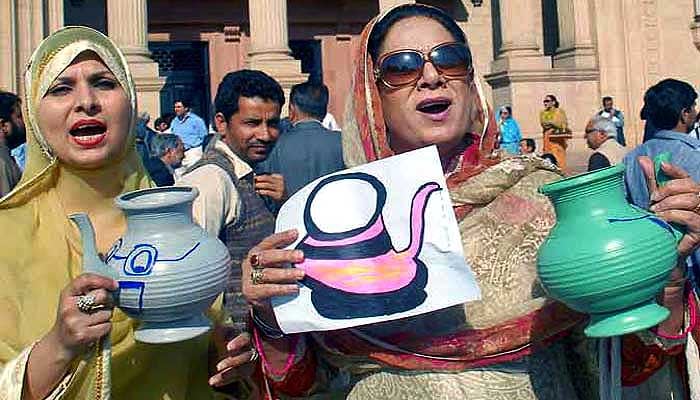How damaging is ‘lota’ politics
Pakistani politics and democracy as a system has damaged itself by not promoting the culture of political parties and their ideologies. Instead, most parties encourage the culture of family politics, and 'lotacracy’ (horse-trading), with the perception that elections could not be won without so-called electables. Today, this culture has not only caused dent in the parties but also created cracks in the political system of the country. It can be stopped, but how? It just requires willpower to change.
Lotas (turncoats) or so-called, electables have no ideology of their own, and are not sincere with any party. They are just like transit passengers, who look for connecting flights. Just look at those fifty, sixty faces and you will find them in all parties at one time or the other. They hardly have any morals, but regrettably they are not rejected by the people in elections. It seems that all the mainstream parties had accepted this unethical norm, as one of the norms of democracy, which in reality is not, if we want to promote party culture instead of cult culture. Families can join any party, which even existed in the West, but a person would have to go through a party process.
It is important to know who actually falls in the category of ‘lotas’. He or she is not someone who quits the party over ideological differences or when party is in power. ‘Lota’ is someone who is habitual of quitting parties for power. He is also someone who, on the basis of his feudal background or because of being a pir, holds voters hostage and gets elected.
Thus, an electable can get you to power, but he is the one who can also play a role in getting you out of power. Thus, you may win election with 50 or 60 electables, but you may lose party and politics because of them as well.
These 'lotas' are causing cracks in major parties. After damaging Pakistan People’s Party, Pakistan Muslim League-N and even Muttahida Qaumi Movement, now they are damaging the Pakistan Tehreek-e-Insaf (PTI).
They are well known faces, who change their loyalties in accordance with the changing trends and political wave. They are the ones who have real lust for power, and they hardly wait a minute in switching sides if their parties seem losing polls.
Had our power elite abolished feudalism soon after Independence, as happened in our neighbouring country India, democracy could have taken roots in its real manifestation. Then feudal lords, Sardars and Chaudhrys would have been replaced by political leaders until now.
Unfortunately, political uncertainty prevailed in the first 25 years, during which political parties could not grow themselves. From 1947 to 1958, Pakistan Muslim League (PML) could neither remain united nor promote democratic culture. Instead, it hand over power to civil and military bureaucracy, which resulted in 1958 martial law. So, Pakistan remained directionless as far as its political system is concerned, resulting in 10 years of martial law or imposed system of basic democracy.
In the first real general elections in 1970, people voted more for the parties than for so-called electables. While in the then East Pakistan people voted for nationalism, in West Pakistan, people voted for Islamic socialism, resulting in the success of Awami League, Pakistan People’s Party and National Awami Party, beside others.
Thus, people voted more for the parties than for individuals. Many big names got defeated in both East and West Pakistan. Even after an unfortunate disintegration of Pakistan, party culture dominated the political scene and many believe, including the PPP critics, that Zulfikar Ali Bhutto could have won the 1977 elections had he not held it a year before and secondly, trusted his committed party men instead of going to electables or feudal lords.
He not only paid the price and faced the allegations of forcibly getting himself and few other feudal lords elected unopposed, but also mishandled the movement against the alleged rigging. Later on, Mualana Shah Ahmad Noorani and the late Prof Ghafoor once told the writer that Bhutto remained a popular leader till his death and even after death. But it provided space to martial law and General Zia and the then establishment adopted the policy of divide-and-rule policy by promoting the culture of lotacracy, strengthened feudalism, Chaudhrys, Sardars and in addition introduced even businessmen to politics.
Elections on non-party basis both in the local bodies and general elections weakened political parties, particularly in the rural areas and made the so-called electables stronger.
Since non-party system was nothing but a way to damage political culture, General Zia allowed formation of a new Pakistan Muslim League from a non-party system, headed by Mohammad Khan Junejo.
However, Junejo surprised Zia when in 1986, he announced return of political system, lifted ban on political parties, allowed exiled leader Benazir Bhutto to return and assured freedom of Press in the country. All these actions disturbed Zia and within two years, he sacked Junejo and laid the foundation of division in the PML, and promoted Nawaz Sharif as an alternative leader. After 1985, electables or lotas were made strong and we could not return to strong party culture or to true democratic system.
Political parties got another chance to abolish the system when Benazir Bhutto returned to the country in 1986. In 1988 elections, the PPP wave and Bhutto charisma defeated strong electables, particularly in Sindh. Leaders like the late Pir Pagaro and the late Ghulam Mustafa Jatoi were defeated by committed PPP leaders like Syed Parvez Ali Shah and Rehmatullah Behan, respectively.
The then establishment, led by the late General Hameed Gul, who was against Benazir, first damaged the political culture by making an anti-PPP alliance, Islami Jamhoori Ittehad (IJI) and later on the establishment conspired against the PPP in 1989 through vote of no-confidence and later by rigging 1990 elections.
Pakistani politics could not recover and almost all parties accepted the lota or electable culture and became part and parcel of political engineering to overthrow each other through the lota culture.
The PML became PML-N and then the PML-Q, while the PPP also saw cracks in its ranks with formation of groups like National People’s Party (NPP) and PPP-Patriots. All this caused the rise of Pakistan Tehreek-e-Insaf (PTI), which after long struggle, registered itself as the third largest party in 2013 elections and pulled over eight million votes in Pakistan.
One of the reasons why the PTI attracted large number of voters is its stand to keep itself away from the so-called electables and lotas and even adopted a system of accepting or rejecting anyone who want to switch his or her loyalty.
The conditions of joining the party included that a person should have no criminal record, he should have not been involved in any corruption case, particularly if he or she remained a minister and there should not be any objection over his joining from the party workers, particularly belonging to that constituency.
The PTI has now compromised on its basic principles, which they stood for till 2011, and chances are that they may win the next election with electables or lotas. But, can Imran change the system of status quo with 50 per cent candidates of status quo politics.
When will these parties learn? Imran himself has admitted that many of its MNAs and MPAs had taken money during the Senate elections and had also taken action against some 20 MPAs, due to which the KP government could not even got its budget passed. The PPP and PML-N both have been accused and victim of this culture.
This culture can be defeated if the Election Commission of Pakistan (ECP) or Parliament bar all parliamentarians from switch sides at least two years before the next elections. All parties will have to abolish the feudal system to save the democratic system.
The writer is senior columnist and analyst of Geo, The News and Jang.
Twitter: @MazharAbbasGEO
-
 Cancer-stricken King Charles At Breaking Point?
Cancer-stricken King Charles At Breaking Point? -
 Andrew Leaves King Charles No More Moves To Play: ‘Can’t Just Say We Got Nothing’
Andrew Leaves King Charles No More Moves To Play: ‘Can’t Just Say We Got Nothing’ -
 Sterling K. Brown Explains How Sharing His Kids' Photos On Social Media Can Keep Them Safe
Sterling K. Brown Explains How Sharing His Kids' Photos On Social Media Can Keep Them Safe -
 Keir Starmer Gives Major Advise To King Charles Amid Andrew Scandal
Keir Starmer Gives Major Advise To King Charles Amid Andrew Scandal -
 Nick Reiner Pleads Not Guilty In Famous Parents' Double Murder Which Shocked The World
Nick Reiner Pleads Not Guilty In Famous Parents' Double Murder Which Shocked The World -
 Benicio Del Toro On Losing Mom In Chldhood: 'I’m Still Dealing With It'
Benicio Del Toro On Losing Mom In Chldhood: 'I’m Still Dealing With It' -
 More Than 500,000 Without Power As Blizzard Hits US Northeast
More Than 500,000 Without Power As Blizzard Hits US Northeast -
 Winona Ryder Lands Secret Role In 'Wednesday' Season Three, Marking Reunion With Tim Burton
Winona Ryder Lands Secret Role In 'Wednesday' Season Three, Marking Reunion With Tim Burton -
 Andrew, Fergie’s Life Without The Bells And Whistles Turns Grimmer: ‘A Lot More Was Happening’
Andrew, Fergie’s Life Without The Bells And Whistles Turns Grimmer: ‘A Lot More Was Happening’ -
 Nicole Kidman And Keith Urban's Divorce Drama Deepens As Teen Daughters 'stick' By Their Mother's Side
Nicole Kidman And Keith Urban's Divorce Drama Deepens As Teen Daughters 'stick' By Their Mother's Side -
 William, Kate Desperate To Make Public Statement Distancing Themselves From Andrew
William, Kate Desperate To Make Public Statement Distancing Themselves From Andrew -
 Charli Xcx Details Boozy Second Wedding To The 1975's George Daniel: 'Everyone Was Hungover'
Charli Xcx Details Boozy Second Wedding To The 1975's George Daniel: 'Everyone Was Hungover' -
 Gracie Abrams Follows 'Kylie Jenner Playbook' With Paul Mescal Romance
Gracie Abrams Follows 'Kylie Jenner Playbook' With Paul Mescal Romance -
 Dua Lipa Shares 'Love Letter' With New Boyfriend After Emily Ratajkowski Confirms Romance With Her Previous Beau
Dua Lipa Shares 'Love Letter' With New Boyfriend After Emily Ratajkowski Confirms Romance With Her Previous Beau -
 Brazilian Beauty Influencer Passes Away After Suffering 'medical Emergency'
Brazilian Beauty Influencer Passes Away After Suffering 'medical Emergency' -
 Sarah Ferguson Turns Into A Bulldozer With Beatrice, Eugenie: ‘Help Me Out’
Sarah Ferguson Turns Into A Bulldozer With Beatrice, Eugenie: ‘Help Me Out’




